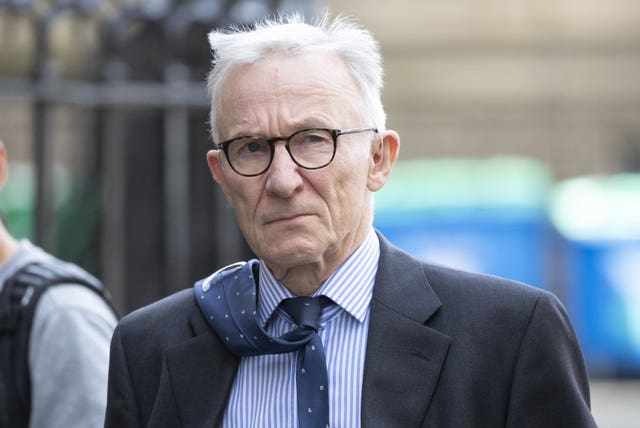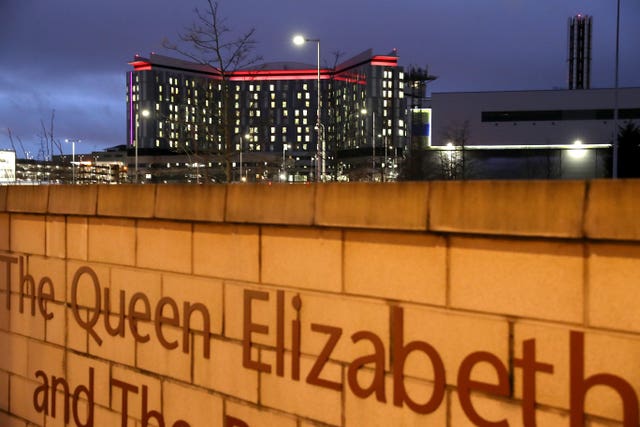
A mother only discovered her cancer patient son had been put on preventative medicine because a Glasgow hospital was “dirty” from medical staff at a clinic in Florida where he had flown for treatment, an inquiry has been told.
Karen Stirrat’s son was diagnosed with cancer when he was three years old and he was treated at the Royal Hospital for Children (RHC) and Queen Elizabeth University Hospital (QEUH) in Glasgow from February 2019 onwards.
The Scottish Hospitals Inquiry (SHI) is investigating the construction of the QEUH campus, which includes the RHC, after issues at the flagship site were linked to the deaths of two children.
Mrs Stirrat’s son was found to have an aggressive brain tumour and underwent surgery and chemotherapy, then in April 2019 was flown to a centre in Florida in the US for proton beam therapy as part of his treatment.
 The inquiry is chaired by Lord Brodie (Jane Barlow/PA)
The inquiry is chaired by Lord Brodie (Jane Barlow/PA)
In her witness statement to the SHI, Mrs Stirrat described how, when they arrived in Florida, doctors there asked for a list of the medication her son was on, which they were told included posaconazole.
She stated that when she read out the list and came to posaconazole the two doctors “just looked at each other” and asked why he was on that, and she told them she had been informed it was part of his chemotherapy regime.
READ MORE: My daughter’s life was put at risk in hospital, says mother
Mrs Stirrat states: “One of the doctors told me it wasn’t part of chemotherapy treatment and he said he was going to call the UK to find out why was on it.
“We met Lacey, one of the nurses who was looking after him in America, the next day and spoke to her about the posaconazole.
“She told us that the doctors from the QEUH told her the reason he was on posaconazole wasn’t anything to do with his chemotherapy treatment and that he was on it because of the hospital.
“I asked her what she meant and she told us it’s the dirty hospital. It’s the dirty water and the building in Glasgow.”
She said the staff in Florida told her that UK doctors had advised that her son should be taken off the posacanazole straight away but that he would have to start taking the medication again when he returned to the UK.
Mrs Stirrat said that when she returned to the UK she asked a nurse at the QEUH why he was on posaconazole and was told it was “because of the building” and that another nurse told her it was “due to the climate we live in”.
The mother gave evidence to the inquiry remotely on Wednesday.
Alastair Duncan QC, lead counsel to the inquiry, asked what impact problems with the environment of the Glasgow hospital have had on the family.
 The inquiry is looking into constructions problems at the Queen Elizabeth University Hospital in Glasgow (Andrew Milligan/PA)
The inquiry is looking into constructions problems at the Queen Elizabeth University Hospital in Glasgow (Andrew Milligan/PA)
She told the inquiry “we don’t trust the hospital” and said that learning about the problems with the Glasgow hospital while they were in Florida was a major issue.
Mrs Stirrat said: “I think, for us, the biggest thing that stood out really was being lied to and, in a foreign hospital, finding out that you have a dirty hospital with dirty water, finding out that your son was on a medication that he should not have been on.
“That right away made us distrust the hospital, and then having no explanation as to why when we came back to the UK. The trust is gone.”
READ MORE: Young cancer patient’s treatment ‘compromised’ due to hospital infection fears
The inquiry is also examining the construction of the Royal Hospital for Children and Young People and Department of Clinical Neurosciences (RHCYP/DCN) in Edinburgh.
It was ordered after patients at the Glasgow hospital died from infections linked to pigeon droppings and the water supply, and the opening of the Edinburgh site was delayed due to concerns over the ventilation system.
Earlier this year, an independent review found the deaths of two children at the QEUH campus were at least in part the result of infections linked to the hospital environment.
The inquiry in Edinburgh, chaired by Lord Brodie, continues.
Health boards will be giving evidence at a later stage in the inquiry.



Why are you making commenting on The Herald only available to subscribers?
It should have been a safe space for informed debate, somewhere for readers to discuss issues around the biggest stories of the day, but all too often the below the line comments on most websites have become bogged down by off-topic discussions and abuse.
heraldscotland.com is tackling this problem by allowing only subscribers to comment.
We are doing this to improve the experience for our loyal readers and we believe it will reduce the ability of trolls and troublemakers, who occasionally find their way onto our site, to abuse our journalists and readers. We also hope it will help the comments section fulfil its promise as a part of Scotland's conversation with itself.
We are lucky at The Herald. We are read by an informed, educated readership who can add their knowledge and insights to our stories.
That is invaluable.
We are making the subscriber-only change to support our valued readers, who tell us they don't want the site cluttered up with irrelevant comments, untruths and abuse.
In the past, the journalist’s job was to collect and distribute information to the audience. Technology means that readers can shape a discussion. We look forward to hearing from you on heraldscotland.com
Comments & Moderation
Readers’ comments: You are personally liable for the content of any comments you upload to this website, so please act responsibly. We do not pre-moderate or monitor readers’ comments appearing on our websites, but we do post-moderate in response to complaints we receive or otherwise when a potential problem comes to our attention. You can make a complaint by using the ‘report this post’ link . We may then apply our discretion under the user terms to amend or delete comments.
Post moderation is undertaken full-time 9am-6pm on weekdays, and on a part-time basis outwith those hours.
Read the rules hereLast Updated:
Report this comment Cancel